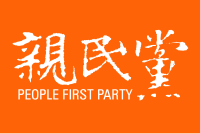People First Party (Taiwan)
|
People First Party
親民黨 Qīnmíndǎng |
|
|---|---|
| Leader | James Soong |
| Founded | 31 March 2000 |
| Headquarters | Taipei, Taiwan |
| Ideology |
Centrism Chinese unification Liberal conservatism |
| Political position | Centre-right |
| National affiliation | Pan-Blue Coalition |
| Legislative Yuan |
3 / 113
|
| Local Councillors |
9 / 906
|
| Website | |
| pfp.org.tw | |
| People First Party | |||||||||||||
| Traditional Chinese | |||||||||||||
|---|---|---|---|---|---|---|---|---|---|---|---|---|---|
| Simplified Chinese | |||||||||||||
|
|||||||||||||
| Transcriptions | |
|---|---|
| Standard Mandarin | |
| Hanyu Pinyin | Qīnmín Dǎng |
| Bopomofo | ㄑㄧㄣ ㄇㄧㄣˊ ㄉㄤˇ |
| Southern Min | |
| Hokkien POJ | Chhin-bîn-tóng |
The People First Party (PFP or Qinmindang, QMD) is a centre-right political party in Taiwan (Republic of China).
The PFP was founded by James Soong and his supporters after his failed independent bid for the presidency in 2000. Soong is the chairman and dominates much of its politics. The name of the party, qinmin, has Confucian connotations.
The official goals of PFP, as regards to cross-strait relationships and diplomacy, is for the ROC to: participate in more international organizations, promote Chinese culture overseas and seek economic and cultural interaction between Taiwan and the mainland. Its views are seen as generally favorable towards Chinese unification and staunchly against Taiwan independence.
The party maintains a close but tense relationship with the Kuomintang (KMT) as part of the pan-blue coalition. However, since PFP had, like the New Party, grown out of the KMT, the two parties had to compete for the same set of voters. This dynamic in which both the KMT and PFP must simultaneously compete and cooperate with each other has led to complex and interesting politics.
In several notable cases, this has led to situations in which both parties have run candidates, but close to the election the party with the less popular candidate unofficially dropped out of the race. This in turn has led to some notable situations when either the PFP or the KMT has campaigned against its own candidate, which has led to intra-party resentment.
To avoid a repeat of this effect, which led to the election of Democratic Progressive Party candidate Chen Shui-bian to the presidency in 2000 by a low share of votes, Chairman Soong ran as vice-president on KMT Chairman Lien Chan's presidential ticket in the 2004 presidential election.
...
Wikipedia

